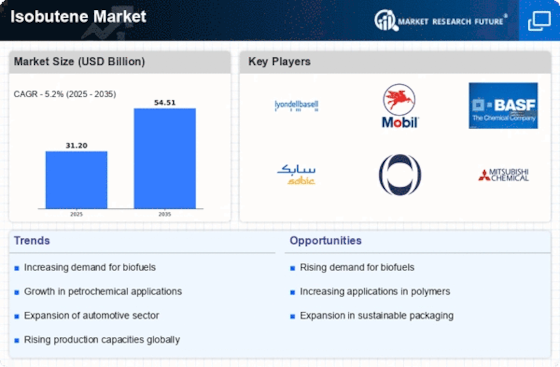Top Industry Leaders in the Isobutene Market

The isobutene market, a crucial player in the petrochemical industry, is experiencing a dynamic shift with rising demand and a fragmented landscape. Understanding the competitive landscape, strategies, and recent developments is vital for navigating this evolving market.
Strategies Adopted by Market Leaders:
-
Vertical Integration: Major players are adopting a vertical integration strategy to gain control over the entire value chain, from feedstock acquisition to derivative production. This ensures stable feedstock supply, reduces costs, and improves profit margins. -
Diversification: Recognizing the volatility of the traditional MTBE market, companies are diversifying their product portfolios towards high-growth applications like MTBE alternatives, butyl rubber, and methacrylic acid. -
Technological Advancements: Investing in R&D for bio-based isobutene production is gaining traction, driven by environmental concerns and potential cost benefits. ExxonMobil's joint venture with World Energy Technologies to produce bio-isobutene from renewable sources is a prime example. -
Geographical Expansion: Emerging economies like China and India are witnessing a surge in demand for isobutene derivatives. Players like SABIC and Mitsui Chemicals are expanding their operations in these regions to capitalize on this growth potential.
Factors Influencing Market Share:
-
Feedstock Availability and Prices: The availability and pricing of crude oil and natural gas, the primary sources of isobutene, significantly impact the market. Fluctuations in these factors can lead to price volatility and supply chain disruptions, affecting market share dynamics. -
Environmental Regulations: Stringent regulations on emissions, particularly concerning MTBE's environmental impact, have led to a decline in its use in gasoline blending. This has spurred the development and adoption of MTBE alternatives, influencing the market share of players involved in their production. -
Technological Innovation: The development of new technologies for bio-based isobutene production and advancements in downstream applications like butyl rubber and methacrylic acid can create opportunities for new players and disrupt the market share of established companies.
Key Companies in the Isobutene market include
- Yuhua Group
- Sumitomo Chemical Co.Ltd.
- Weifang Binhai Petro-Chem Co.Ltd.
- TPC Group
- Exxon Mobil Corporation
- Nizhnekamskneftekhim
- Enterprise Products Partners
- China Petroleum & Chemical Corporation
- SINOPEC Beijing Yanshan Company
- Yuhuang Chemical Inc
- Zoucheng Qifa Chemical Co.Ltd.
- LyondellBasell Industries N.V.l
- SONGWON Industrial Group
- Qixiang Electron Science & Technology Co.Ltd.
- Evonik Industries AG.
Recent Developments
July 2023: Shell and LanzaTech launch a pilot project to produce isobutene from captured carbon dioxide, demonstrating the potential for carbon capture and utilization technologies in the market.
August 2023: ExxonMobil and Braskem expand their joint venture agreement, highlighting the importance of collaboration in navigating the evolving market landscape.
September 2023: Sinopec successfully starts up its new isobutene production facility in Jiangsu province, China, adding significant capacity to the global market.










